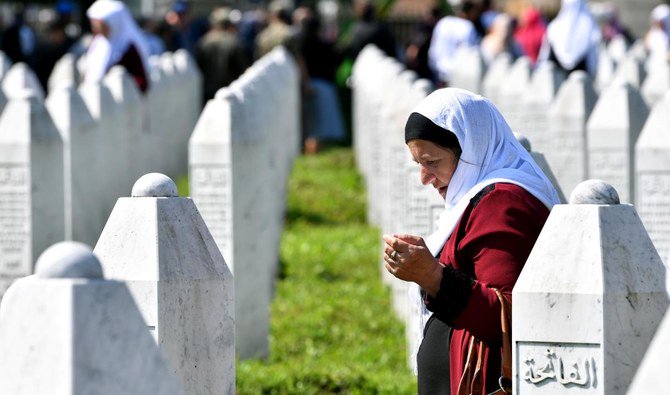Bosnian Muslims mark 1995 massacre of thousands with burials

Bosnia-Herzegovina: Thousands of mourners gathered in Bosnia on Thursday to commemorate the 24th anniversary of the Srebrenica massacre, the worst mass killing in Europe since World War II.
Relatives of the more than 8,000 Bosnian Muslim men and boys killed by Bosnian Serb troops were among those attending a ceremony at a memorial site that included the burial of 33 newly identified victims of the July 11-22, 1995 massacre.
More than 1,000 are still considered missing from the mass slaughter during the Bosnian civil war.
Many victims were ambushed along forest routes while fleeing Srebrenica in scorching heat without food or water. They were either shot on the spot, or taken to collective centers where they were executed and thrown into mass graves
Mevlid Halilovic, a relative of a victim, said many of the people who carried out the massacre were still at large.
"Those who did this (killing) have to be punished," he said. "And it was all done by our (Serb) neighbors, those who live just around here."
Nura Begovic was burying the remains of her brother, who was identified through his hand bone.
"I spent 24 years looking for his body and I only found one bone," she said. "But today, both I and my family have found peace."
Both Bosnian Serb wartime leader Radovan Karadzic and military commander Ratko Mladic, who led troops that captured Srebrenica on July 11, 1995, were sentenced by a UN war crimes court to life in prison.
Although the mass killings were branded genocide by international courts, Serbian and Bosnia Serb officials refuse to use the term. They did not send official delegations to the commemoration on Thursday.
A joint statement issued by European Union foreign policy chief Federica Mogherini and EU enlargement commissioner Johannes Hahn described the "genocide" in Srebrenica as "one of the darkest moments of humanity in modern European history."
"There is no place for inflammatory rhetoric, for denial, revisionism or the glorification of war criminals," the statement said. "Attempts to rewrite history in Bosnia and Herzegovina or anywhere are unacceptable."
